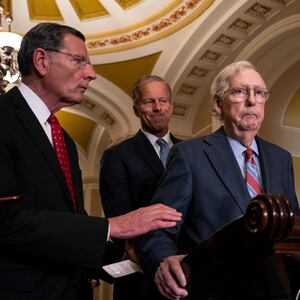It’s been a cruel summer, as the Baby Boomers (and their predecessors, the Silent Generation) who run this country are finally running out of gas. To paraphrase a snarky tweet from Iowa Hawk, it feels like American politics has suddenly gone from “ruling class” to “drooling class.”
In case you missed it, on Wednesday, Senate Majority Leader Mitch McConnell, 81, suffered a horrifying spell that left him frozen and speechless for what felt like an eternity, before finally being ushered away from the cameras and microphones.
Then, on Thursday, Sen. Dianne Feinstein, 90, had to be told by a staffer to “just say aye” during a vote. Feinstein’s team tried to downplay the incident, but according to NBC News, she was also heard “voting against another measure before she was corrected and switched to ‘yes.’”
Meanwhile, President Joe Biden, 80, is relying on short note cards and even shorter airplane stairs to avoid gaffes and stumbles. Biden is the oldest president in U.S. history, and the man most likely to replace him, Donald Trump, is just a few years younger.
Trump is already the second-oldest president (he was 70 in 2017). That puts him behind Biden, but ahead of Ronald Reagan, who fended off criticism about his age and left office when he was the same age Trump is now. In the summer of 2020, he appeared to have trouble lifting a glass of water to his mouth, and the next day, required help while "gingerly" walking down a ramp after speaking at West Point)" href="https://urldefense.com/v3/__https:/www.nytimes.com/2020/06/14/us/politics/trump-ramp-water-glass-health.html__;!!LsXw!QITgrMpCUApsm05yJrbzl3V3pw7Tb6kYoYW3ZdC25hAO9OHqKYWnYy9pTIl3v5K9EKDvO3BosEQF75JdWvzOLR1Kvtw$">"gingerly" walking down a ramp after speaking at West Point. Generally, Trump, who is 77, presents as virile, but if we’ve learned anything it’s that age can sneak up on you.
This last week makes me think that America’s politicians age in the same way that (according to Ernest Hemingway) people go bankrupt: “Gradually, then suddenly.”
We reached the “suddenly” stage for McConnell and Feinstein, on back-to-back days.
It’s not like we weren’t warned. Back in March, McConnell (the longest-serving party leader in U.S. Senate history) was hospitalized after tripping at a hotel. (We recently learned that he has fallen a few other times, as well.)
Around the same time, Feinstein (the U.S. Senate’s oldest member) was hospitalized with shingles.
It’s worth pointing out that these are interesting lives and careers of consequence—partly because they have been in power for so long (Biden was elected to the U.S. Senate in 1972, McConnell in 1984, and Feinstein in 1992).
Everyone knows about Biden’s personal struggles, including the tragic loss of his wife and daughter in 1972.
Less is probably known about McConnell and Feinstein.
Back in 2016, I interviewed McConnell at the American Enterprise Institute (AEI) about his memoir, The Long Game.
We talked about how he survived polio, punched a neighbor bully as a kid, stood up as an early civil rights ally, climbed the greasy pole to majority leader, and crushed a 2014 Tea Party challenger when other establishment Republicans were falling.
McConnell is probably more responsible than anyone for the Supreme Court’s 2022 decision to overturn Roe v. Wade (as a conservative, I see this as a good thing; you may disagree).
Even if you disagree with McConnell’s politics, you’re likely to miss him when he’s gone—especially when you consider the likelihood that Democrats will find another Republican leader they can work with to the degree Biden has been able to work with McConnell.
Feinstein’s exodus (she has announced she will not seek re-election next year) will likely be less consequential, but her story is no less unique.
She was first elected to the San Francisco Board of Supervisors in 1969, and became the city’s first woman mayor—having been elevated to that position after the assassinations of Mayor George Moscone and Supervisor Harvey Milk.
Feinstein was at her desk at City Hall when an ex-supervisor walked past her and murdered her two colleagues. “I went down the hall. I opened the wrong door. I opened (Milk’s) door. I found Harvey on his stomach. I tried to get a pulse and put my finger through a bullet hole. He was clearly dead,” she later recounted.
Feinstein went on to be California’s first female U.S. senator and the author of 1994’s assault weapons ban, to name just a couple of key points on her resume.
It is sad that we are about to lose some experienced and accomplished leaders. But we should also be sad that America now looks like something of a gerontocracy, where decrepit leaders hang on for dear life, and where we let them, partly because there aren’t any obvious young replacements on the horizon.
Perhaps it is ironic that the convergence of these stories coincided with the 80th birthday of the Rolling Stones frontman Mick Jagger.
Like our political class, wild horses couldn’t drag them away. (Of course, we kept “voting for them”—by hoovering up all their concert tickets.)
I’m old enough to remember when everyone joked about the geriatric Stones going on the road for their “Steel Wheels” tour.
That was thirty-four years ago.
In recent decades, the marvels of modernity have allowed more of us to work productively into an advanced age. This is good news. But while one can stave off the effects of aging for so long, Mother Nature always wins. Always.
We are seeing that on full display this week.
With apologies to Mick, it turns out that time isn’t on our side. You don’t have to be a political rock star to see that.







